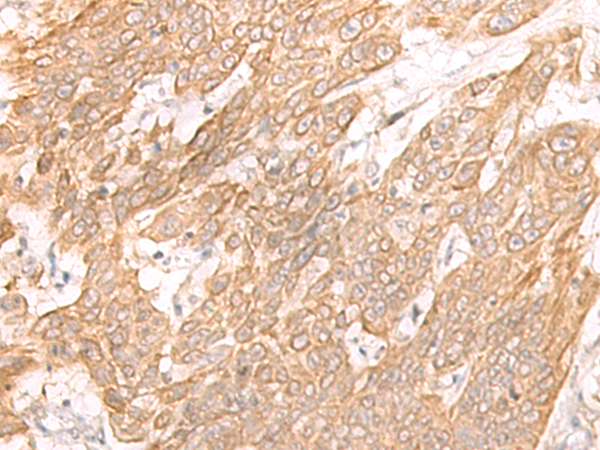
| WB | 咨询技术 | Human,Mouse,Rat |
| IF | 咨询技术 | Human,Mouse,Rat |
| IHC | 1/30-1/150 | Human,Mouse,Rat |
| ICC | 技术咨询 | Human,Mouse,Rat |
| FCM | 咨询技术 | Human,Mouse,Rat |
| Elisa | 1/5000-1/10000 | Human,Mouse,Rat |
| Aliases | IL29; IL-29 |
| Host/Isotype | Rabbit IgG |
| Antibody Type | Primary antibody |
| Storage | Store at 4°C short term. Aliquot and store at -20°C long term. Avoid freeze/thaw cycles. |
| Species Reactivity | Human |
| Immunogen | Synthetic peptide of human IFNL1 |
| Formulation | Purified antibody in PBS with 0.05% sodium azide and 50% glycerol. |
+ +
以下是3篇关于IFNL1(干扰素λ1)抗体的代表性文献摘要(基于公开研究归纳,非具体文献原文):
1. **文献名称**:*Antiviral Activity of Interferon-λ1 in Chronic Hepatitis C Virus Infection*
**作者**:Robek MD, et al.
**摘要**:该研究探讨了IFNL1在丙型肝炎病毒(HCV)感染中的抗病毒作用,通过单克隆抗体阻断IFNL1信号通路,发现其可抑制病毒复制,提示IFNL1抗体在治疗慢性HCV中的潜在应用价值。
2. **文献名称**:*IFN-λ1 (IL-29) Antibody Modulates Airway Inflammation in a Murine Model of Viral Exacerbation*
**作者**:Koltsida O, et al.
**摘要**:研究利用抗IFNL1抗体在小鼠模型中阻断IFNL1信号,发现其可减轻呼吸道合胞病毒(RSV)引发的炎症反应,表明IFNL1抗体在调控病毒性呼吸道疾病中的免疫调节作用。
3. **文献名称**:*Interferon Lambda 1 as a Predictor of Treatment Response in Autoimmune Hepatitis*
**作者**:Zhang Y, et al.
**摘要**:通过检测患者血清IFNL1水平及抗体结合特性,发现IFNL1抗体表达与自身免疫性肝炎的治疗反应相关,提示其作为疾病生物标志物或治疗靶点的潜力。
**注**:以上内容为领域知识归纳,具体文献需通过PubMed或Google Scholar以关键词“IFNL1 antibody”或“Interferon lambda 1 therapeutic”检索获取原文。
Interferon lambda 1 (IFNL1), also known as interleukin-29 (IL-29), is a cytokine belonging to the type III interferon (IFN-λ) family, which includes IFNL1. IFNL2. IFNL3. and IFNL4. These cytokines signal through a heterodimeric receptor complex composed of IL-10Rβ and IFNLR1. activating JAK-STAT pathways to induce interferon-stimulated genes (ISGs) with antiviral and immunomodulatory effects. Unlike type I interferons, IFNLs primarily target epithelial and immune cells, playing critical roles in mucosal immunity, particularly against viral infections (e.g., hepatitis B/C, influenza) and in regulating inflammation.
IFNL1 antibodies are tools designed to detect, neutralize, or modulate IFNL1 activity. Polyclonal or monoclonal antibodies against IFNL1 are used in research to study its expression, signaling mechanisms, and interactions with pathogens or host cells. Neutralizing antibodies help dissect IFNL1's functional contributions in antiviral responses, autoimmune diseases, or cancer. Clinically, IFNL1 antibodies have potential therapeutic applications, such as blocking excessive inflammation in chronic infections or enhancing antiviral defense in immunocompromised patients. Additionally, genetic variants near the IFNL locus (e.g., IFNL3/4 SNPs) are linked to hepatitis C treatment outcomes, driving interest in IFNL1-specific antibodies for diagnostic or prognostic assays. However, cross-reactivity with other IFN-λ members and tissue-specific receptor distribution pose challenges in antibody development. Overall, IFNL1 antibodies remain vital for elucidating the biology of type III interferons and advancing targeted therapies.
×